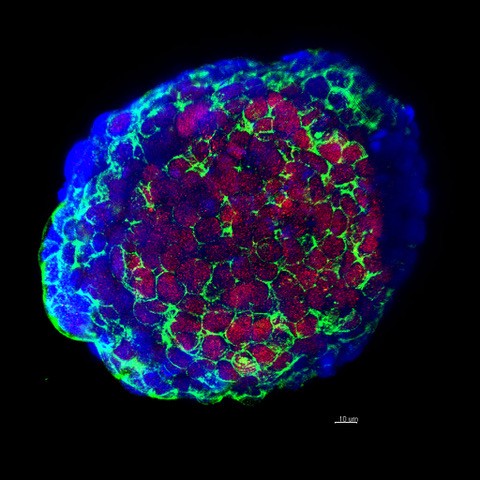Weill Cornell Medicine awarded $11.3M grant for prostate cancer research
By Kathryn Inman and Joseph Bonner
Weill Cornell Medicine has been awarded a five-year, $11.3 million Specialized Programs of Research Excellence (SPORE) grant from the National Cancer Institute (NCI), part of the National Institutes of Health, to improve detection, diagnosis and treatment of prostate cancer – a disease that affects one in six men.
The NCI offers SPORE grants that focus on cancers associated with 19 specific organ sites, groups of highly related cancers or diseases that share a common pathway. The SPORE grant is the first awarded to Weill Cornell Medicine and will expand the prostate cancer basic and translational research program at the institution’s Sandra and Edward Meyer Cancer Center and the Caryl and Israel Englander Institute for Precision Medicine.
“We are extremely proud to join an elite group of institutions working toward decreasing the suffering caused by prostate cancer,” said principal investigator Dr. Mark Rubin, founding director of the Englander Institute for Precision Medicine and a professor of pathology and laboratory medicine and of pathology in urology at Weill Cornell Medicine, and director of the Department for Biomedical Research and leader of precision medicine at the University of Bern, Switzerland. “Despite years of effort trying to understand the biology of this disease, we still have many fundamental challenges to address, including why African-American men develop a more aggressive form of prostate cancer and why some patients develop a rare subtype that is resistant to therapy.”
The grant, which Dr. Himisha Beltran, assistant professor of medicine at Weill Cornell Medicine, will co-lead, will support four research projects focused on highly translational areas relevant to the detection and treatment of aggressive prostate cancer, each led by a basic scientist and translational clinical investigator.
Projects will be aimed at improving the detection and treatment of a rare, treatment-resistant form of prostate cancer called neuroendocrine prostate cancer; exploring a molecular subtype of prostate cancer characterized by mutations in a gene called SPOP, which occurs in 10 to 15 percent of prostate cancers; and improving the understanding molecular variations in prostate cancer tumors. The SPORE grant will have significant infrastructural support for big data management, featuring a team of computational biologists and biostatisticians. It will also provide dedicated resources for tissue collection, organoid creation and molecular studies on patient samples.
In addition, the grant includes yearly funding to jump-start new high-risk and high-reward studies led by Weill Cornell Medicine researchers, as well as a career enhancement program to support junior investigators who seek to enter the field of prostate cancer research. “We are excited that matching institutional funds will help us recruit leading scientists into the field of prostate cancer research,” Rubin said.
This work and resulting findings will enable Weill Cornell Medicine researchers to develop an approach to treating prostate cancer that aligns their expertise in translational and genomic research with the care of men, Rubin said. Early detection of aggressive prostate cancer could improve clinical risk assessment and reduce overtreatment, and the development of unique biomarkers and treatment strategies could reduce the probability of drug resistance and disease progression, improving outcomes for men with metastatic disease.
“This prestigious grant will enable us to enhance our innovative, translational research into prostate cancer and inspire new collaborations as we work together to find a cure for this disease,” said Dr. Augustine M.K. Choi, the Stephen and Suzanne Weiss Dean of Weill Cornell Medicine. “The team of SPORE investigators is exceptional, and its groundbreaking work will undoubtedly advance our mission of scientific discovery and patient care, reinforcing Weill Cornell Medicine’s reputation as a leader in research.”
Lewis Cantley, Ph.D. ’75, who has many years of experience working with or co-leading SPORE grants, will work closely with the Weill Cornell Medicine SPORE team.
“This is an amazing accomplishment and a major milestone for Weill Cornell Medicine,” said Cantley, the Meyer Director of the Sandra and Edward Meyer Cancer Center and a professor of cancer biology in medicine at Weill Cornell Medicine. “It will provide dedicated support for prostate cancer research that can be leveraged to help develop other types of program projects and grants. We believe this will yield some of the best research at our institution, inspiring our top investigators to consider how their science might be applied to address the challenges of understanding prostate cancer.”
“The SPORE grant will facilitate collaboration and accelerate the translation of scientific discoveries into the clinic,” said Beltran, who is director of clinical activities at the Englander Institute for Precision Medicine at Weill Cornell Medicine and an oncologist at NewYork-Presbyterian/Weill Cornell Medical Center. “The grant’s focus is translational research, which means our projects have a higher likelihood of going from bench to bedside and impacting patients.”
Weill Cornell Medicine investigators have developed their research projects with the support of the Prostate Cancer Foundation, priming them for SPORE funding.
Additional investigators on the SPORE grant include Karla Ballman, Dr. Chris Barbieri, Julie Boyer, Olivier Elemento, Paraskevi Giannakakou, Lorraine Gudas, Dr. Juan Miguel Mosquera, Dr. David Nanus, David Rickman, Dr. Brian D. Robinson, Dr. Douglas Scherr, Michael Shen and Ronglai Shen at Weill Cornell Medicine; Dr. Scott Tomlins at the University of Michigan; and Francesca Demichelis from the University of Trento, Italy.
Kathryn Inman is a writer for Weill Cornell Medicine. Joseph Bonner is a freelance writer for Weill Cornell Medicine.
Media Contact
Get Cornell news delivered right to your inbox.
Subscribe